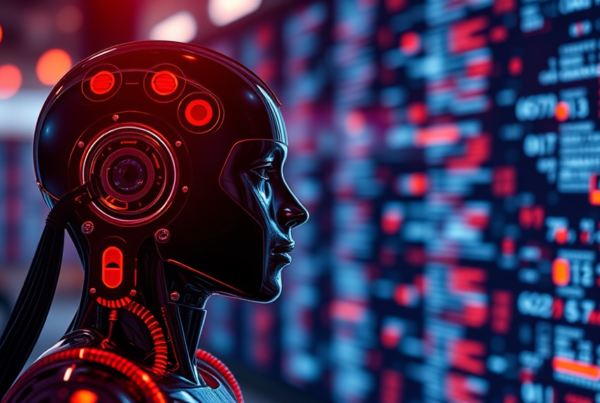Harnessing the Power of AI for Enhanced Cybersecurity in Businesses
Leveraging AI for Robust Cybersecurity in Businesses
In today’s digital landscape, where cyber threats are constantly evolving, businesses must explore innovative solutions to safeguard their data and systems. One emerging technology that holds immense potential in the realm of cybersecurity is Artificial Intelligence (AI). By harnessing the power of AI, businesses can enhance their defensive capabilities and stay one step ahead of cybercriminals.
Proactive Threat Detection and Mitigation
AI-powered cybersecurity solutions can analyze vast amounts of data, identifying patterns and anomalies that may indicate potential threats. This proactive approach allows businesses to detect and mitigate security breaches before they can cause significant damage. AI algorithms can rapidly sift through vast amounts of network traffic, user behavior, and security logs, spotting signs of malicious activity that human analysts may miss.
Automated Incident Response
In the event of a security incident, AI can play a crucial role in streamlining the response process. AI-driven systems can autonomously detect, investigate, and respond to security alerts, reducing the time it takes to identify and contain threats. This automated approach not only enhances the speed of the response but also frees up human security professionals to focus on more complex and strategic tasks.
Personalized Threat Intelligence
AI can analyze threat intelligence data from various sources, including security research, dark web forums, and industry reports, to provide businesses with personalized insights. By understanding the specific threats and attack vectors targeting their industry or organization, companies can tailor their security measures and allocate resources more effectively.
Add AI with the help of experts who get it
Vulnerability Management and Patching
Maintaining a secure IT infrastructure requires constant vigilance and the timely application of security patches. AI can assist in this process by continuously scanning systems and networks, identifying vulnerabilities, and prioritizing the most critical issues for remediation. This proactive approach helps businesses stay ahead of potential exploits and reduces the attack surface.
Adaptive Access Control
Traditional access control systems rely on static policies that may not effectively address the dynamic nature of modern work environments. AI-driven access control can leverage behavioral analytics, contextual information, and machine learning to adaptively grant, deny, or revoke access privileges based on user patterns, device posture, and other risk factors. This helps organizations maintain a robust security posture while ensuring seamless user experiences.
Bolstering Human Expertise
While AI can automate many security tasks, it is not a standalone solution. The most effective cybersecurity strategies involve a synergistic collaboration between AI and human security experts. AI can assist security professionals by augmenting their capabilities, freeing them from repetitive tasks, and providing valuable insights, while human experts can provide the necessary contextual understanding, critical thinking, and decision-making to enhance the overall security posture.
Ethical Considerations and Responsible AI Deployment
As businesses embrace AI in their cybersecurity efforts, it is crucial to address ethical considerations and ensure the responsible deployment of these technologies. This includes ensuring transparency, accountability, and adherence to data privacy regulations, as well as proactively mitigating the potential risks of AI-based systems, such as bias, algorithmic errors, and unintended consequences.
Add AI with the help of experts who get it
The integration of AI into cybersecurity strategies offers businesses a compelling opportunity to enhance their defensive capabilities, stay ahead of evolving threats, and safeguard their valuable assets. By leveraging the power of AI, organizations can streamline their security operations, improve incident response, and empower their security teams to make more informed and effective decisions. However, the successful implementation of AI in cybersecurity requires a holistic approach that balances technological advancements with ethical considerations and strong governance frameworks.
Mitigating Cyber Threats through AI-Driven Strategies
Harnessing AI for Robust Cybersecurity
In today’s rapidly evolving digital landscape, businesses of all sizes face an ever-increasing array of cyber threats. From data breaches and ransomware attacks to sophisticated phishing scams, the need for robust cybersecurity measures has become paramount. Fortunately, the integration of Artificial Intelligence (AI) into cybersecurity strategies is revolutionizing the way organizations defend against these threats.
Proactive Threat Detection and Response
One of the key advantages of AI in cybersecurity is its ability to detect and respond to threats in real-time. Traditional security systems rely on pre-defined rules and signatures to identify known threats, which can be easily circumvented by increasingly sophisticated cyber attackers. AI-powered security solutions, on the other hand, utilize advanced machine learning algorithms to continuously analyze and learn from vast amounts of data, enabling them to identify emerging threats and anomalies that would otherwise go unnoticed.
Enhanced Vulnerability Management
Vulnerability management is a critical component of any effective cybersecurity strategy, as unpatched vulnerabilities can provide entry points for cyber attackers. AI-driven vulnerability management systems can automate the process of identifying, prioritizing, and remediating vulnerabilities, significantly reducing the time and resources required to maintain a secure IT infrastructure. By leveraging predictive analytics, these systems can anticipate and address vulnerabilities before they can be exploited, providing a proactive defense against cyber threats.
Add AI with the help of experts who get it
Intelligent Incident Response
In the event of a successful cyber attack, the ability to respond quickly and effectively is crucial in mitigating the impact and preventing further damage. AI-powered incident response systems can analyze vast amounts of data from various sources, including security logs, network traffic, and user behavior, to identify the root cause of an incident and formulate an appropriate response plan. This enables security teams to act swiftly and decisively, reducing the overall impact of the attack and minimizing the risk of further compromise.
Automated Security Operations
The sheer volume of security alerts and the complexity of modern IT environments can quickly overwhelm security teams, leading to missed threats and delayed responses. AI-driven security orchestration and automated response (SOAR) platforms can streamline and automate various security operations, from threat hunting and incident investigation to security event correlation and remediation. By automating these repetitive tasks, security teams can focus on more strategic and high-impact security initiatives, improving overall organizational resilience against cyber threats.
Enhancing Human Expertise
While AI-powered cybersecurity solutions can automate many tasks and enhance the efficiency of security operations, they should be viewed as a complement to human expertise, not a replacement. By combining the analytical power of AI with the contextual understanding and decision-making capabilities of human security professionals, organizations can create a formidable defense against cyber threats. AI can amplify the efforts of security teams, freeing them from mundane tasks and empowering them to make more informed, data-driven decisions.
As cyber threats continue to evolve, businesses must adopt a proactive and innovative approach to cybersecurity. By harnessing the power of AI, organizations can establish a robust and adaptable defense against a wide range of cyber threats, ensuring the protection of their critical assets and the resilience of their operations in the face of increasingly complex and persistent attacks.
Conclusion
Businesses today face an ever-evolving landscape of cyber threats, making it crucial to leverage cutting-edge technologies to enhance their cybersecurity efforts. The integration of AI into cybersecurity strategies has emerged as a game-changer, providing organizations with powerful tools to mitigate and respond to a wide range of cyber risks.
Add AI with the help of experts who get it
By harnessing the power of AI, businesses can unlock a new level of proactive and adaptive security measures. AI-driven systems can analyze vast amounts of data, detect anomalies, and identify potential threats in real-time, enabling organizations to stay one step ahead of cybercriminals. Through machine learning algorithms, these systems continuously learn and adapt, enhancing their ability to recognize and respond to emerging threats.
Furthermore, AI-powered cybersecurity strategies can streamline incident response and management, automating time-consuming tasks and freeing up security teams to focus on high-impact activities. By leveraging AI-driven threat intelligence and predictive analytics, businesses can anticipate and prepare for potential attacks, minimizing the impact and disruption caused by cyber incidents.
As the reliance on digital technologies continues to grow, the imperative for robust and intelligent cybersecurity solutions becomes increasingly clear. By embracing the transformative potential of AI, businesses can fortify their defenses, protect their valuable assets, and maintain the trust of their customers in an increasingly complex and cyber-volatile landscape.



